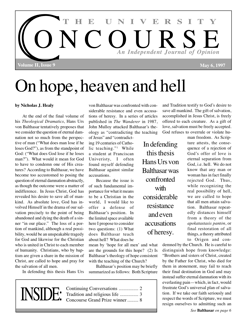Charisms are traditional
by Alicia Hernon
I greatly appreciated Adam Tate’s bringing up the issue of charismatic spirituality on our campus because I think it is an issue that has caused great division and confusion among our students. In the shuffle, it is easy to lose sight of what the charismatic gifts really are and where they came from. No one can deny that God has used these gifts to completely change our campus, so they are an important part of what makes the life at Franciscan University different from any other place on earth.
I do not think that the notion that a person’s spirituality should not affect their celebration of the liturgy is a Catholic idea. The spirituality of Catholics in Africa is not going to be the same as those in Rome; a Mass said in a cloistered Carmelite convent will differ from one celebrated in a Catholic elementary school, but all can be perfectly in line with the Church’s directives. To suggest that the entire world should celebrate the liturgy in exactly the same manner would greatly rob our Church of the marvelous diversity found among the peoples she embraces.
Secondly, I do not think that using the charismatic gifts can be described as a spirituality at all, in the sense that Mr. Tate described it. Throughout the New Testament spiritual gifts that would be characterized as “charismatic” today are spoken of as gifts for the whole Church (see, for instance, 1Cor. 12:7-11). These gifts were given to the apostles and to Our Lady on Pentecost, when the Church was born; they were used by the early Christians as part of the sacraments of initiation, and they inspired the apostles to spread the gospel throughout the world. These gifts are at the heart of our Church!
In Fanning the Flame, a study on the baptism of the Holy Spirit in relation to Christian initiation, the authors cite the testimony of three Doctors of the Church, Cyril, Hilary and Chrysostom, to demonstrate that “the baptism in the Holy Spirit is not a matter of private piety, but of the official liturgy, and of the church’s public life. Historically, the baptism in the Holy Spirit is integral to those initiatory sacraments which are constitutive of the church, namely, Baptism, Confirmation, and Eucharist. In this sense, the baptism in the Holy Spirit is normative.”
These gifts are for every Catholic, because this life in the Spirit is not one spirituality of the Church, but the spirituality of the Church. With this understood, I would say that not only should all spiritualities be welcomed into the liturgy, but charismatic spirituality especially should be embraced by all Catholics, as it was in the early Church.
This may be difficult for some to accept, because in our classification of “traditionalists” and “charismatics” we have stereotyped and created prejudice which has bred division. The truth is that we should all be able to describe ourselves as both “traditional” and “charismatic,” since the charismatic gifts are among the traditions of the Church!
Just as we are all called to be open to devotion to Mary or to the Sacred Heart, we are also all to be open to the gifts of the Spirit. This obviously does not mean that we are required to take each of these facets of the Church and incorporate it completely into our spiritual lives; but it does mean that to be truly Catholic we should be open to all the gifts the Church has to offer, even those that may not be particularly to our liking.
I cannot end without addressing the comment about music on campus made by Mr. Tate in his article. As a former member of Music Ministry on campus, I had to laugh a bit when I read his admonition about the lack of organ music at campus liturgies. There is one small detail that he may not realize: to have organ music, one must have an organist. And among college age students, indeed even in the population in general, organists are in scarce supply. Fr. Ron has offered many times to teach anyone who wants organ music how to play the organ, but there haven’t been any volunteers that I know of in the seven years I have been associated with FUS. We do however, have an abundance of guitar players, which is because the guitar is one of the easiest instruments to play and sing along to, hence the many guitar-led masses. Here is a challenge to take what one reads in Church documents and know that reality does not always match up to the ideal.
In closing, I would ask that we let go of stereotypes and see that the charisms are gifts, not invented by man or drummed up by his emotions, but given to us all by God, who means to use them to draw us closer to Himself and to each other.
Alicia Hernon, Class of ‘94


